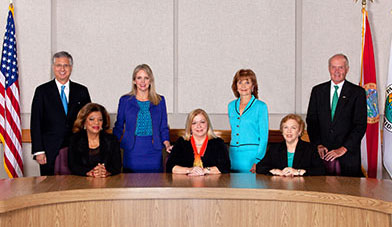The Palm Beach County Commission heard a presentation on county priorities for the upcoming state legislative session on Tuesday, and commissioners said they would like more emphasis on vehicles-for-hire legislation.
The commissioners had spent more than an hour in an earlier discussion about a proposed vehicles-for-hire ordinance before postponing action to wait and see what the state legislature does, if anything.
For more than a year, the county has been struggling with finding the proper regulations for vehicles-for-hire organizations such as Uber and Lyft.
Legislative Affairs Director Todd Bonlarron gave the report, commenting on the photo of a taxicab that was coincidentally on the cover of his presentation.
“I didn’t realize how much that would play into your agenda,” Bonlarron said.
Based on their earlier discussion and public comment, commissioners revised some of the goals directed to Bonlarron, supporting state regulation of the insurance requirements for taxis, limousines and transportation network companies (TNCs). Such statewide regulations would apply to both taxis and TNC companies such as Uber and Lyft.
Commissioner Melissa McKinlay said she would seek to oppose any efforts by TNC companies to engage in paratransit services.
“Also, I think we would all support the state moving forward with level-two background checks,” McKinlay said.
McKinlay made a motion to support statewide level-two background checks for drivers and, after some discussion, it carried unanimously.
Other items on the legislative agenda include several Glades regional initiatives to reduce unemployment there.
The legislative staff also plans to increase initiatives for the television and film industry. “Tax credits in Florida have been very difficult to come by for the last two years,” Bonlarron said.
Another initiative will seek to strengthen home-rule growth management policies as they relate to traffic. “We wanted to strengthen some of the language in there in terms of making sure that the legislature does not usurp our authority in terms of zoning issues and those related to density of property in our county,” he said.
Under public safety, Bonlarron said that they will work on mental health and substance abuse funding aimed at reducing the jail population.
“Yesterday, Gov. Rick Scott announced that he was going to advocate for $19 million in health funding in his budget, as well as some new proposals,” he said.
They are also working on domestic violence issues.
“We believe that we will have some draft legislation in the next couple of weeks that reflect some of the items that we have been advocating the past year, particularly where it pertains to programs for perpetrators of domestic violence,” Bonlarron explained.
The county is also working on language for the juvenile detention facility to make sure that the transition is smooth to the new provider, as well as language regarding burglar alarm legislation and how individuals are alerted when an alarm is tripped.
They will advocate for $9 million in Public Education Capital Outlay (PECO) funding for the Palm Beach State College campus in Loxahatchee Groves, as well as additional funding for Florida Atlantic University’s Jupiter campus.
Environmental and water resources priorities include looking at water issues from a regional perspective. “We’re going to work with some of our partners here in Palm Beach County and Broward County and other areas,” he said.
They will continue to support at the state level the Southeast Florida Regional Climate Change Compact reached by Broward, Miami-Dade, Monroe and Palm Beach counties in January 2010 to coordinate activities across county lines. They will also watch solar energy and oil drilling policies closely.
“I sent out a memo separately to this, sharing some opportunities that we’ve had to work with the Department of Environmental Regulation, but we’ll continue to advocate for some of those specifics that we have in our climate change compact in terms of working with the state from a regulatory perspective, as well as preventing any type of drilling near some of our sensitive aquifer and conservation land areas,” Bonlarron said.








